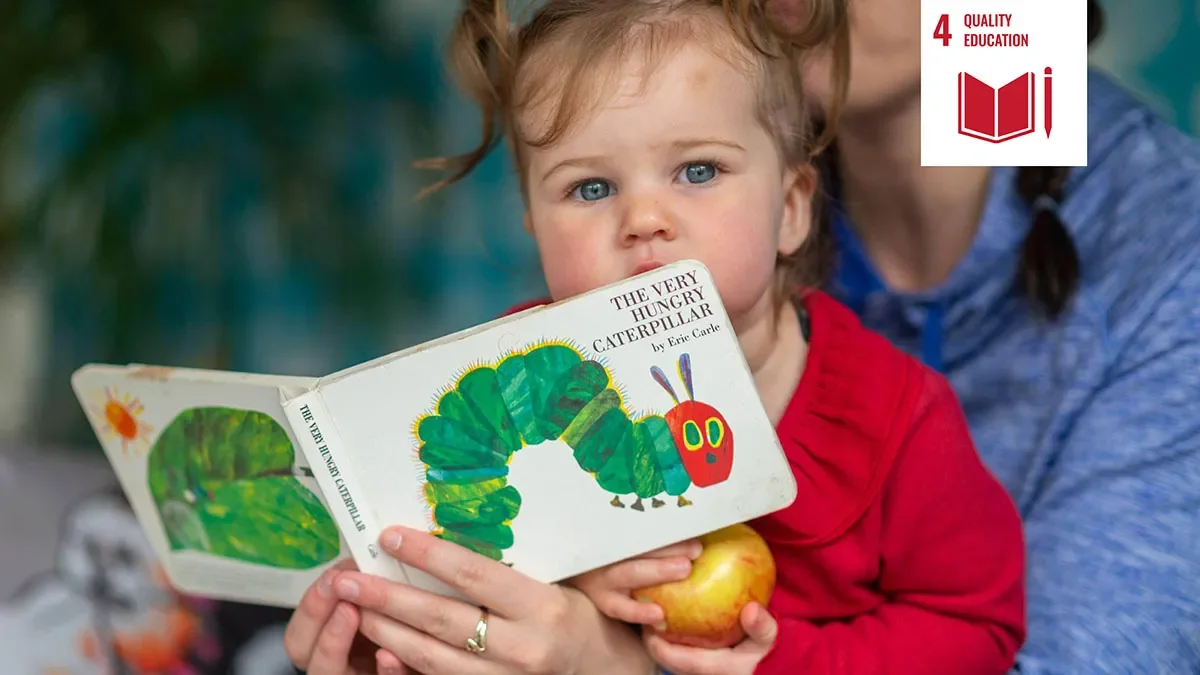
Reading is an important life skill and critical for educational attainment. There is compelling evidence from international studies that home literacy practices such as reading to young children support their oral language skills, literacy development and academic outcomes.
However, we do not know how early we should start reading with children to support these skills. Ultimately, we need to know more about early home literacy practices in Ireland and the ways in which these are related to later literacy and educational outcomes. Research from Dublin City University is beginning to tease this out.
The icon on this article represents contribution towards UN Sustainability Goal 4: Quality Education. The Sustainable Development Goals are 17 objectives designed by the United Nations to serve as a shared blueprint for peace and prosperity for people and the planet.
Analysis of national archived data
Previously we had limited national data on children’s early home literacy environments in Ireland meaning that we couldn’t previously investigate the relationships between these home literacy activities and children’s language and literacy skills.
In a study of the early home literacy practices of over 9,000 parents and their infants, we used archived data from the “Growing Up in Ireland” study, the first national longitudinal study of children’s development in Ireland to ask if reading to babies as early as 9 months could impact oral language skills in early childhood.
We found that 80% of 9-month-old Irish children are read to by parents. Families who were more likely to report reading with children were those with higher educational progression, fewer depressive symptoms, and those who report a higher-quality home language environment (e.g. talking more to children during everyday activities.
Stronger expressive vocabulary skills
Children who were read to at 9 months had stronger expressive vocabulary skills at 3 years, even after accounting for important variables such as family income and the home literacy environment at 3 years.
Through a mediation analysis we also found that shared reading at 9 months was positively associated with vocabulary at 3 years through an associated increase in the frequency of reading to the child and number of books in the home at 3 years.
Our findings suggest that shared reading when children are 9 months confers a benefit to their oral language almost three years later. This is an important finding given the strong relationship between preschool oral language skill and future reading comprehension and broader academic achievement.
Sustained interest in reading
In a subsequent longitudinal study building on this body of work, we found that early shared reading and availability of children’s books at home predicted higher reading scores at age 9, even when we took into account important characteristics at age 3.
The association between early shared reading and later reading success was partly explained by an increased likelihood of reading for pleasure at age 7 which in turn predicted higher reading scores at age 9. Parents who read to children as early as age 3 were also more likely to read to children at age 5, suggesting a sustained interest in reading.
This second study also found that access to books at age 3 was associated with reading success at age 9 through an increased number of children’s books in the home at age 5 and enhanced likelihood of reading for pleasure at age 7. These results extend the findings of the previous study by offering interest and motivation as a potential pathway through which the early home environment is related to long-term literacy outcomes.
National book gifting scheme
Currently in Ireland, there is no national universal book gifting scheme from birth. Targeted supports for infant shared reading are also predominantly for families in areas of social marginalisation. Our findings show the importance of shared reading for all infants in Ireland. Our research makes a case for a national universal approach to the provision of books.
This research was undertaken in collaboration with Kathryn A. Leech (University of North Carolina), Kathleen H. Corriveau (Boston University) and Michael Daly (Maynooth University).







